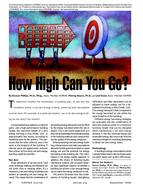The Relative humidity is an important aspect of IAQ. Epidemiological studies have associated dampness with health effects such as respiratorydiseases. In order to design appropriate building envelopes for healthy and sustainable low energy buildings, it is essential to use simulations duringthe design phase to predict the performance during operational conditions. “Well-insulated” building envelopes have a higher risk of moistureproblems than less insulated which increase the importance of a high quality assessment. The quality of simulations depends on the quality of theinput data that in turn depends on the availability of appropriate reference data. Available reference data on indoor moisture conditions aregenerally from older studies or not appropriately “time-resolved”. Since the indoor moisture conditions depend on user behavior, for exampleoccupancy rates and cooking, washing and bathing practice, that changes over the years, older reference data might be inappropriate. As part of anongoing research project that studies “user related” parameters in buildings, indoor and outdoor moisture conditions, relative humidity, moisturecontent and moisture supply have been measured in 75 apartments at different locations in Sweden during five months covering autumn andwinter. This paper presents part of the results obtained during the first five months of measurements. The aim is to provide data that supportsdesign of sustainable low energy buildings with good IAQ.
Citation: IAQ Conference: IAQ 2013: Environmental Health in Low Energy Buildings
Product Details
- Published:
- 2013
- Number of Pages:
- 8
- File Size:
- 1 file , 1000 KB
- Product Code(s):
- D-2013IAQConf-24


